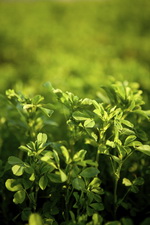
Peptide Holds Promise for Increasing Crop Yields without More Fertilizer
December 9, 2015| |
 Molecular biologists from the University of Massachusetts Amherst (UMassAmherst) have discovered a "double agent" peptide in an alfalfa that promises to improve crop yields without increasing fertilizer use. The UMassAmherst team together with colleagues from the Noble Foundation, report that alfalfa appears to use an advanced process for putting nitrogen-fixing bacteria, rhizobia, to work more effectively after they are recruited from soil to fix nitrogen in special nodules on plant roots.
Molecular biologists from the University of Massachusetts Amherst (UMassAmherst) have discovered a "double agent" peptide in an alfalfa that promises to improve crop yields without increasing fertilizer use. The UMassAmherst team together with colleagues from the Noble Foundation, report that alfalfa appears to use an advanced process for putting nitrogen-fixing bacteria, rhizobia, to work more effectively after they are recruited from soil to fix nitrogen in special nodules on plant roots.
In alfalfa, the transformation of bacteria is called differentiation. NCR peptides found exclusively in the nodule, act on the bacteria in the differentiation process. The researchers discovered that one of these peptides, DNF4, also known as NCR211, supports nitrogen-fixing bacteria when inside the plant, and block free-living bacteria outside. The dual effect of DNF4/NCR211 may reflect a mechanism to ensure that the rhizobia stay in a properly differentiated state.
According to Dong Wang, professor of biochemistry and molecular biology at UM Amherst, discovering NCR211 peptides that maintain bacterial survival inside host cells may turn out to be a key factor in future efforts to improve legume crops without using more fertilizer, an important development for farming in developing countries.
For more information, read the news release from UMassAmherst.
| |
Biotech Updates is a weekly newsletter of ISAAA, a not-for-profit organization. It is distributed for free to over 22,000 subscribers worldwide to inform them about the key developments in biosciences, especially in biotechnology. Your support will help us in our mission to feed the world with knowledge. You can help by donating as little as $10.
-
See more articles:
-
News from Around the World
- PNAS: To Feed the World in 2050 will Require a Global Revolution
- USDA Issues Preliminary Extended Determination of Nonregulated Status for V11 Potatoes
- Scientists Review ODM as Precision Genome Editing Technology
- USDA Extends Deregulation to GE Corn MZHG0JG
- Peptide Holds Promise for Increasing Crop Yields without More Fertilizer
- Arcadia Biosciences and BGI to Create Rice Genetics Resource
- Chemicals Helping Plants Defend Themselves Could Replace Pesticides
- Increased CO2 Altered Photosynthesis Over the 20th Century
- Swedish Board of Ag: CRISPR-Cas9 Doesn't Fall Under EU GM Definition
-
Research Highlights
- Scientists Investigate Metabolic Changes in GE Maize Over-expressing the Aspergillus niger phyA2
- Overexpression of the MYB37 Enhances Both Drought Tolerance and Seed Productivity in Arabidopsis
- Downregulation of Cytokinin Oxidase 2 Increases Tiller Number and Improves Rice Yield
-
Beyond Crop Biotech
- GM Mice Reveals Secret to Painless Existence
- SINE Compounds Inhibit Expression of XPO-1 and Shows Antitumor Properties in Prostate Cancer Models
-
Announcements
- Cell Culture World Congress 2016
-
Read the latest: - Biotech Updates (November 12, 2025)
- Gene Editing Supplement (October 29, 2025)
- Gene Drive Supplement (February 22, 2023)
-
Subscribe to BU: - Share
- Tweet
